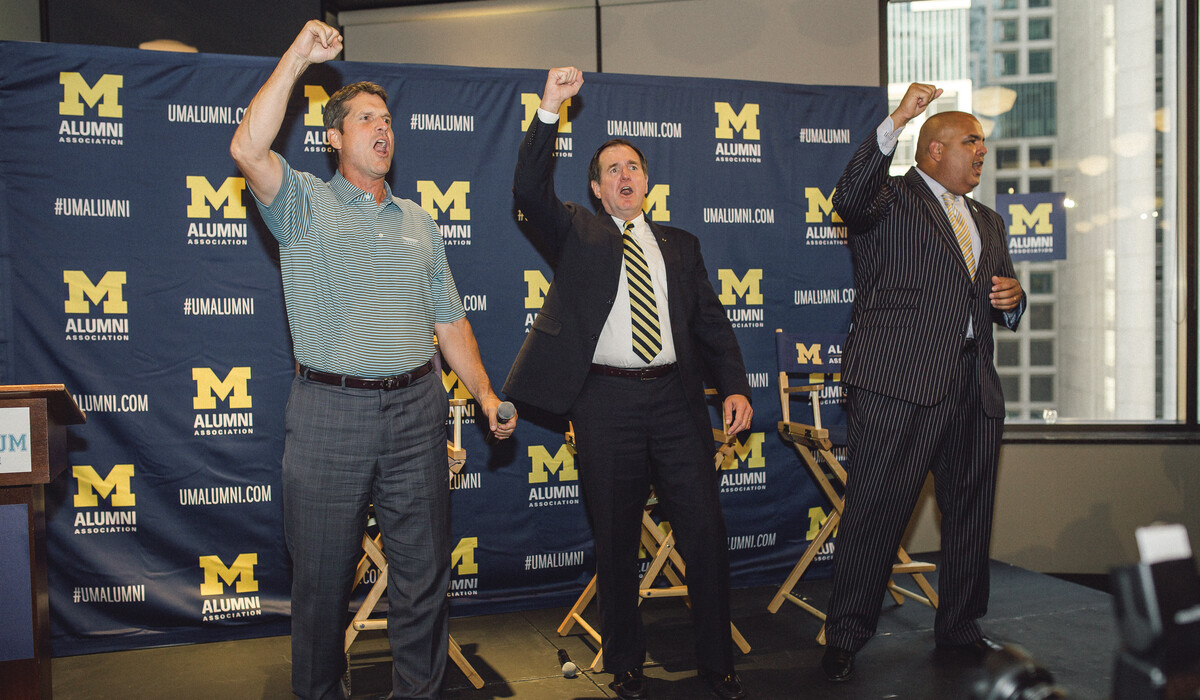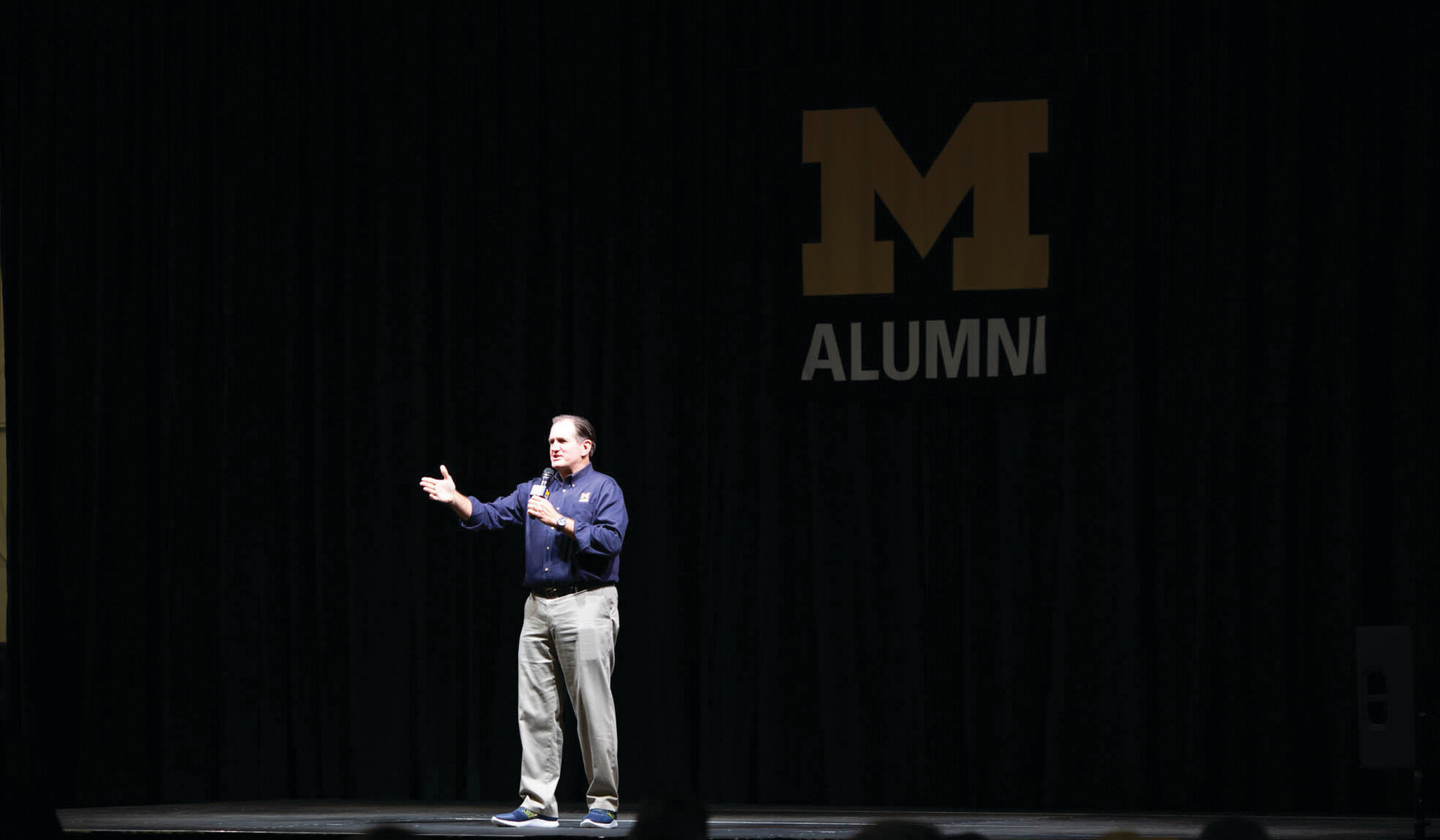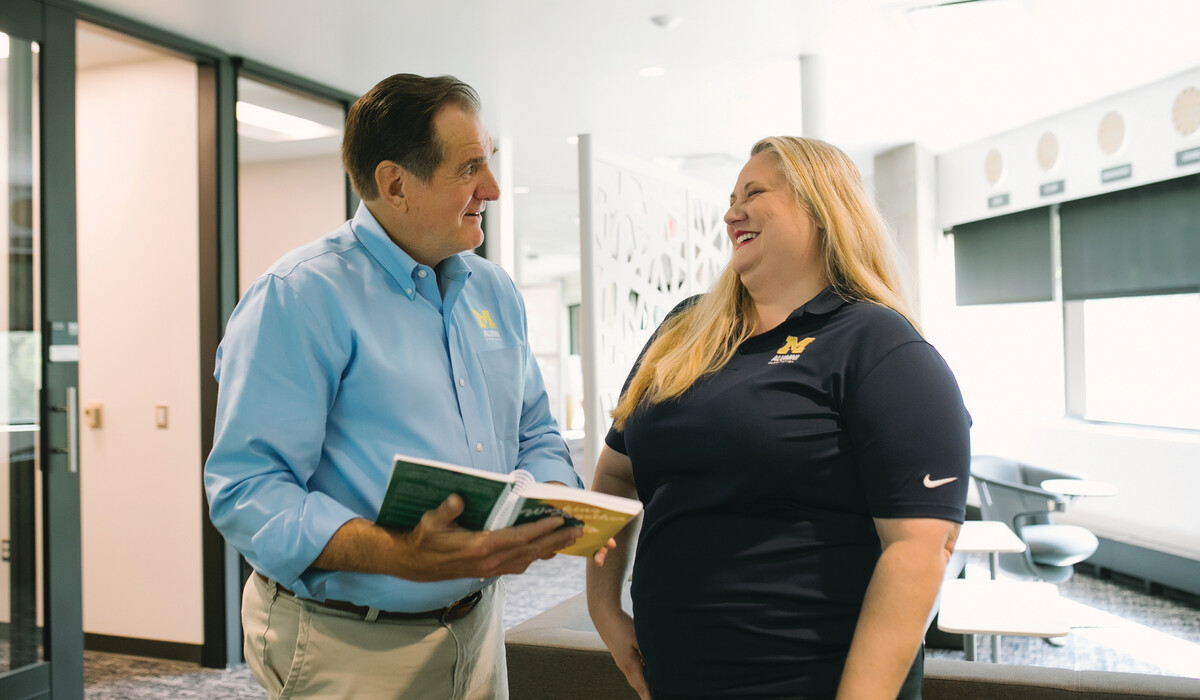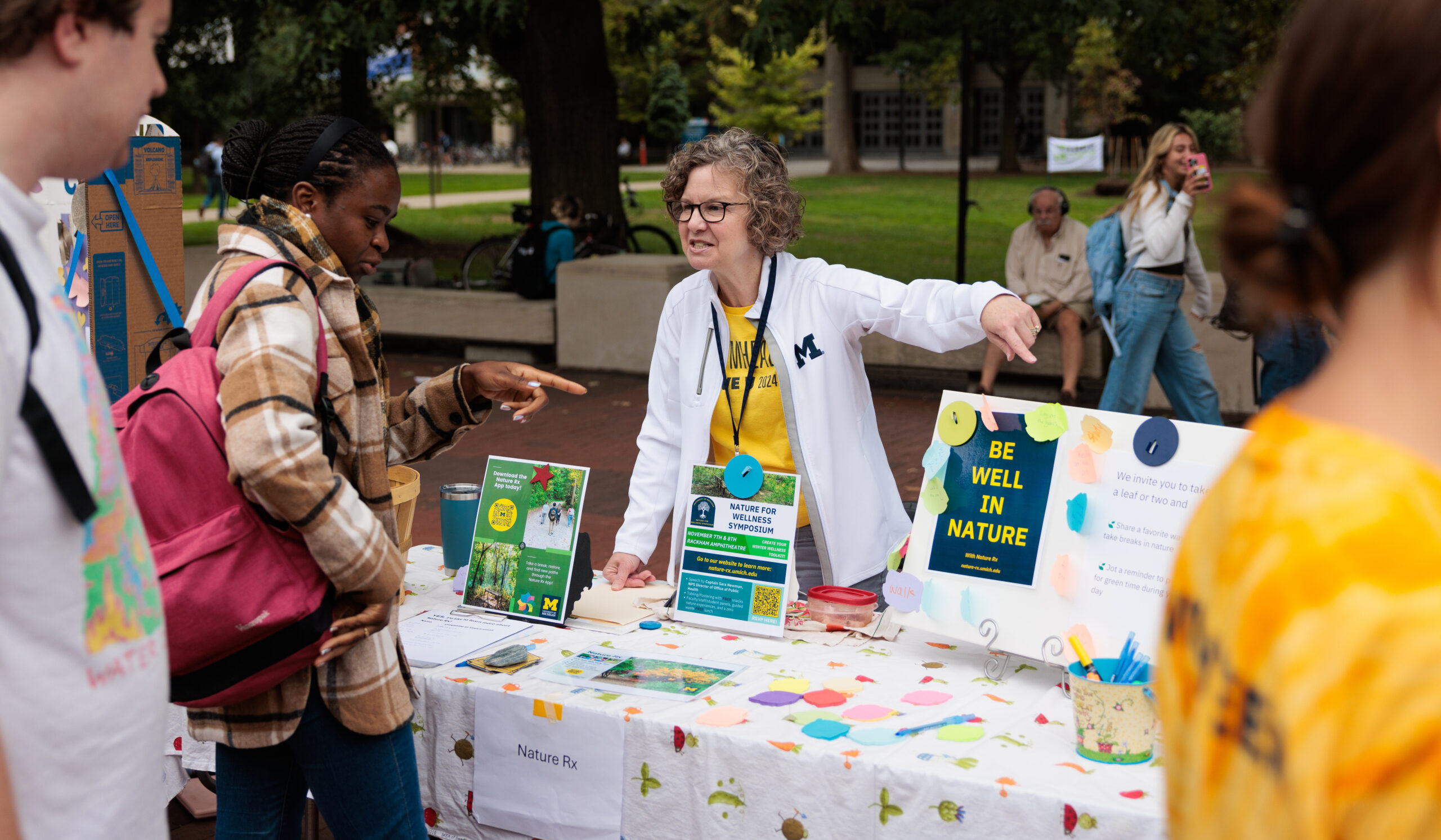A Life of Service
•
Photo by Nicole Haley
When Steve Grafton went to work for an alumni association at Mississippi State University in 1987, it was primarily to network and explore a future run for Congress. But his plans abruptly changed.
“A realization hit me that what matters most to me is education,” Grafton says. He pointed to a quote that former U.S. President John F. Kennedy frequently used: “The tide raises all the boats in the harbor.”
“For me, education is that tide,” Grafton says. “I don’t care who you are or where you come from, if you can get an education, you will have opportunities. I saw what it did for me.”
And so began a life of service in higher education that ultimately led him to the Alumni Association of the University of Michigan. Grafton, 64, is retiring from the Association later this year after leading the organization for the last 28 years. The Alumni Association’s Board of Directors named Corie Pauling, ’93, Grafton’s successor.
This spring, relaxing on his property overlooking a small lake in Mississippi, he reflected on his life and career.
“Paramount to all I have done is the belief in the value of education for the well-being of society and the importance of diversity and service,” Grafton says, when asked what drove him professionally.

Learning on the Job
Grafton grew up in Pascagoula, Miss., in a working-class family. His father owned a carpet-and-drapes store, his mother stayed home, and money was tight with four children.
He became the first member of his family to go to college, attending Mississippi State. Grafton was only able to afford it thanks to a political science scholarship he received from the then-Sen. John Stennis and some settlement money he received from a car accident injury that ended his hopes for a college football scholarship.
Upon graduating from Mississippi State in 1980, he went to work first as assistant press secretary and later as a legislative aide for Stennis in Washington, D.C. Seven years later, he accepted a job with the alumni association at Mississippi State.
“Honestly, I didn’t know anything about being an alumni director when I took that job,” he says of his 28-year-old-self. But two years later, Grafton was proficient enough in his role to become one of the founders of the Council of Alumni Association Executives (CAAE), a national organization that exists to this day.
At Mississippi State, Grafton created educational programming that highlighted the expertise of graduates, bringing them back to campus to interact with students, faculty, and staff. He brought a new “business approach” to the job, starting an affinity credit card benefit program, restructuring the budget process, taking over the annual giving fund, and renovating the alumni office.
But as Grafton started to talk with more colleagues at other alumni associations across the country, he found many were self-governing, meaning they were independent from the university development teams. That model appealed to Grafton, who “wanted the alumni to have more of a say in the university.”
The president at Mississippi State, however, felt differently. After six years in the job, Grafton decided it might be time to move on.
“I have always been comfortable with change,” he says, thinking back to that early period of his career. “I am a change agent. I always want to make things better, even if that means taking some pretty big risks. I think I made Mississippi State’s Alumni Association much stronger. But a lot of people felt threatened by my actions.”

Coming to U-M
At the same time, Bob Forman, MPA’59, decided to step down after 28 years of leading the Alumni Association of the University of Michigan. When the search committee showed him a list of potential candidates, he recalls feeling disappointed with the group. But Forman knew Grafton from their work together on various organizations.
“This is the best alumni job in the country, and U-M deserves someone of the highest quality,” Forman recalls. “I knew Steve should be on the list. He had the personality, was a great leader, and had early political experience which would help at such a large public university.”
U-M was not the only organization after Grafton’s expertise. After his third trip to Ann Arbor, an airport loudspeaker summoned him to the nearest phone. It was the University of Texas-Austin offering to match U-M’s offer if he would come there instead.
Grafton remembers his wife Carol and him creating an exercise to decide their future.
“Carol had to pick the place she thought would be best for raising our family, and I picked the place I thought would be best for my career,” he says. “We both picked Michigan.”
Finally in charge of a self-governing alumni association, Grafton got to work transforming the organization.
He did an initial restructuring, eliminating some positions and creating others. Over time, he reorganized the alumni clubs all over the country, offering them resources if they would partner with the Alumni Association rather than remain independent. He also met one of the board’s most important goals: 100,000 members by the Association’s 100th birthday in 1997.
Equally important to Grafton in his first few years on the job was getting to know U-M’s Black alumni in Detroit.
“Frankly, as a white guy from Mississippi, I knew they must have had concerns about my getting the job,” he says.
After meeting with the Black alumni group several times, he learned they had been trying to raise money for years for a Martin Luther King Jr. scholarship at U-M and were frustrated to have only garnered $200,000 of support. Grafton committed to raising $1 million dollars for the scholarship.
“It was the first contribution Carol and I made to the University,” he recalls. Grafton fulfilled his promise and the Dr. Martin Luther King Jr. Scholarship continues to support Black students to this day.
“Paramount to all I have done is the belief in the value of education for the well-being of society and the importance of diversity and service."
— Steve Grafton
Birth of LEAD
Growing up in Mississippi, Grafton witnessed racial discrimination while attending a segregated Baptist church and elementary school. But when he got to high school, he joined the basketball team where half of the players were Black.
“We were like brothers,” Grafton says. “I recall thinking that everything I had learned at that point about the differences between Black and white people was completely untrue.”
From then on, as president of the student council in high school, as head of the student association in college, and in his professional career as a leader of two separate alumni associations, he worked to combat discrimination.
In 2006, Michigan voters approved a proposal that banned discrimination and preferential treatment on the basis of race, ethnicity, gender, or national origin in public education, effectively banning affirmative action and creating additional challenges for minority applicants.
“Everyone knew this would drastically affect diversity at [the University of] Michigan,” Grafton recalls. “Our board said, ‘We want to do something.’”
At that point, Grafton, who had been leading the Alumni Association of the University of Michigan for about a dozen years, began exploring options.
Because the Alumni Association is separate from the University, Grafton and the board wondered if the organization could start a scholarship for students who would suffer under the new law, even if the University could not.
“We thought, ‘We can’t be sued for having a scholarship because it’s not the University.’ That is how the conversation started for us and became the framework for LEAD,” he says.
A lawyer confirmed that the plan was legal. Two years later, the Alumni Association established the LEAD Scholars program, creating a scholarship for accepted underrepresented minority students to help them pay for their education at U-M.
Since 2008, more than 600 students have received an education at U-M with the financial and personal support of the LEAD Scholarship, which includes both programming and mentoring.
For Grafton, however, the impetus was also personal.
“I know that without money to get a degree you can’t get a good job and participate in the economy. You’re simply stuck,” Grafton says.
Kathleen Wilson-Thompson, ’79, chair of the Alumni Association’s Board of Directors, says Grafton has always had a vision for bringing people together.
“This man from Mississippi has done more than anyone could imagine around advancing diversity at U-M,” she says. “You need more than just the ability to do the work, you have to want to do it, and Steve always wants to do the work.”

Pushing for Equity
In the days following the murder of George Floyd in 2020, Grafton found himself grappling with society’s and the University’s relationship with race.
“I had been working on all these issues but was not seeing a lot of progress,” he says. “It made me realize that something had to happen. We are never going to progress until we recognize our own role. Racism might have its genesis some 400 years ago, but it is still thriving. I’m from the South and symbolic of this issue. I can’t hide from that.”
Grafton decided that the Association needed to redouble its efforts.
“We need to create a place where every person, regardless of their identity, experience, or background feels the Alumni Association is a place for them,” he says.
From the Association’s Alumni Education and Career Programs to the Alumni Travel Program and Camp Michigania, Grafton wants to ensure everyone feels welcome. That may mean partnering more with Black-, Asian-, and LGBTQ+-owned businesses and opening Michigania to first-time campers.
Grafton is also proud of transforming the board of the Alumni Association. He began by reducing the board from around 60 members to a more manageable group of about two dozen. He also committed himself to making it more diverse by compiling a list of alumni he met who he thought might add a different perspective to the board. Today, three-quarters of the 23 members of the board are exceptionally successful alumni who are people of color.
Laura Wayland, executive director of Northwestern’s Alumni Association, says Grafton has been a profound leader when they gather at the Big Ten Alumni Relations Institute and CAAE conferences.
“Especially around diversity, equity, and inclusion, Steve has really made himself vulnerable in settings to allow other people to know it is a safe space. He tells us we must view this work as a movement, not a moment. He tells us if we can change alumni and be more inclusive, they will take that out into society and the world. He is so respected in the field that everyone listens to him. He is a genuine leader,” Wayland says.

Family, Staff Support
Looking back, Grafton readily admits that without Carol and his two sons by his side, traveling to bowl games every Christmas, and attending tailgates, he would not have been able to succeed professionally and have a family life, given the demands of the job. In his retirement, he looks forward to tending the many acres of trees and hiking paths on his property and enjoying time with his children and grandchildren.
He also truly appreciates his staff.
“One of the things I feel proudest of is finding such incredible people to be on our team from the top to the bottom,” he says. “They are an incredible group of hard-working people. I really love them all.”
When asked about his hopes for the Association after his departure, Grafton says, “I feel like the things we have done so far are at the front end of our knowledge. So, to know what is past that and will happen in the future is impossible. That will be up to my successor.”
JENNIFER CONLIN, ’83, is a freelance writer based in Ann Arbor.



